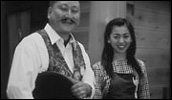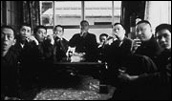9 Souls
- Year
- 2003
- Original title
- Nain Souruzu
- Japanese title
- ナイン・ソウルズ
- Director
- Cast
- Running time
- 119 minutes
- Published
- 4 September 2003



by Tom Mes
The past few years, one of the favoured subjects of Japanese filmmakers was that of disaffected youth. Young Toshiaki Toyoda added more than his own two cents with his debut films Pornostar (1998) and the magnificent but much overlooked Blue Spring (2002). The reason for the latter's lack of international exposure may well have been down to the fact that by the time it came out, the whole youth-gone-wild genre was already looking old hat. Whereto next then for a director who seemed to specialise in the matter? The simple answer is: forward. Toyoda's latest film witnesses the birth of an assured, mature director capable of handling multi-character storylines with confidence.
The nine souls of the title are nine escaped convicts. All male, they diverge in age, background and crime. There is Torakichi (Harada), the eldest and the group's natural leader, who killed his own son; Kazuma (Chihara), a former biker who stabbed four of his own gang; Inui (Suzuki), an epileptic mad bomber; the diminutive doctor Shiratori (Yamada), who was jailed for aiding suicide; the reclusive Michiru (Matsuda), a young man who murdered his own father; the temperamental Ushiyama (Dairaku); former chinpira Shishido (Onimaru); pimp Kiyoshi (Kee) and small-time porn entrepreneur Fujio (Itao). One thing they share: they all have unfinished business to take care of and family members or a loved one to make amends with.
After hijacking a van, they set out in the direction of an elementary school at the foot of Mount Fuji, where their cellmate, soul number ten that was dragged off to solitary moments before the nine men found their escape route, is supposed to have hidden his stash of counterfeit yen. But they find the site vacant of any cash. Packing themselves back into the van, they head towards the suburbs and the city, with the men parting from the others' company one by one to attempt to pick up what is left of their lives.
Starting out as absurd comedy with surrealist touches, the tone of 9 Souls grows increasingly dramatic as the story progresses. The combination of outright comedy and poignant tragedy is a tricky one, and there are examples galore in world cinema that testify how easy it is to mismanage the balance. The Brits manage to get it right from time to time, but for every Brassed Off there is a Peter's Friends whose up-down-up-down structure is too artificial and predictable to work. In 9 Souls, the change is gradual, with elements of tragedy always present within the comedy and vice versa. That the protagonists walk around in drag or wear false moustaches and glasses has no negative impact on their later much more serious encounters with the ghosts of their past. On the contrary, it makes the more serious parts of the film more impressive, since their earlier clowning made us care for them all the more.
Toyoda handles the inner dynamics of the group well. Never letting the atmosphere in the back of the cramped van escalate into predictable melodramatic tensions, he brings out the individuality of each member then creates links between them: the similarity in age of Michiru and Kazuma, a shared fondness for porn between Kiyoshi and Fujio, and the irony of the combination Torakichi - Michiru, the former having murdered his own son and the latter his own father. The director is aided in this by an excellent cast, headed by Yoshio Harada, whose career ranged from 1970s youth action pics, via countercultural epics like Shuji Terayama's Pastoral: To Die in the Country (Den-en ni Shisu, 1974), into 80s macho swagger and through his stunning lead turn in Rokuro Mochizuki's superb Onibi: The Fire Within (1997). Here he combines a commanding screen presence with the kind of vulnerability and ability for self-effacement that comes with age and experience. Toyoda also brings back the two leads of his previous films, Koji Chihara and Ryuhei Matsuda, as Kazuma and Michiru, as well as supporting actors Onimaru, Kee and the wee Yamada.
Toyoda adds occasional touches of surrealism that work surprisingly and marvellously well (a red neon-fronted strip club appears in the middle of nowhere, clouds change shape at Michiru's command, Tokyo turns to ashes before our eyes), a style he continued into the follow-up, the much-lauded Hanging Garden (Kuchu Teien).